ethinyl estradiol and norethindrone (birth control)
Pronunciation: ETH in il ess tra DYE ole and nor ETH in drone
Brand: Blisovi 24 FE, Estrostep Fe, Femcon FE, Kaitlib FE, Lo Minastrin Fe, Microgestin 24 FE, Norinyl 1+35, Ortho-Novum 7/7/7, Taytulla, Tri-Norinyl, Zenchent
Nortrel 0.5/35
35 mcg-0.5 mg

Nortrel 1/35
35 mcg-1 mg, round, yellow, imprinted with b, 949

Nortrel 1/35
35 mcg-1 mg, round, white

Nortrel 7/7/7
triphasic 0.5 mg-0.75 mg-1 mg

Junel 1/20
20 mcg-1 mg, round, yellow, imprinted with b, 977

Junel Fe 1/20
with iron 20 mcg-1 mg

Junel 1.5/30
30 mcg-1.5 mg, round, pink, imprinted with b, 978

Junel Fe 1.5/30
with iron 30 mcg-1.5 mg

Tri-Legest Fe
with iron triphasic 20 mcg-30 mcg-35 mcg, round, yellow

Balziva
35 mcg-0.4 mg

Aranelle
triphasic 0.5 mg-1 mg-0.5 mg

Loestrin 21 1/20
20 mcg-1 mg, round, yellow, imprinted with b, 977

Brevicon
35 mcg-0.5 mg, round, blue/peach
Microgestin 1.5/30
30 mcg-1.5 mg, round, green, imprinted with WATSON, 631

Microgestin 1/20
20 mcg-1 mg, round, white, imprinted with WATSON, 630

Microgestin FE 1.5/30 (obsolete)
30 mcg-1.5 mg, round, green, imprinted with WATSON 075
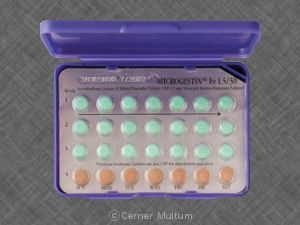
Microgestin FE 1/20
with iron 20 mcg-1 mg, round, white, imprinted with WATSON 630
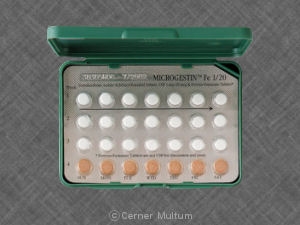
Necon 0.5/35
35 mcg-0.5 mg, round, yellow, imprinted with 507, WATSON
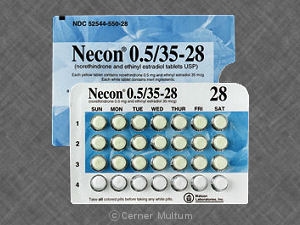
Necon 1/35
35 mcg-1 mg, round, yellow, imprinted with 508, WATSON
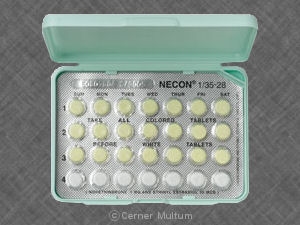
Necon 7/7/7
triphasic 0.5 mg-0.75 mg-1 mg
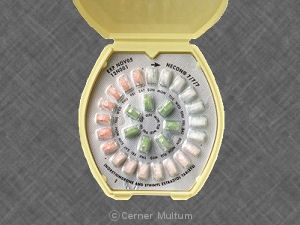
Norinyl 1+35
35 mcg-1 mg, round, green, imprinted with 259, WATSON

Zenchent Fe
35 mcg-0.4 mg, round, orange, imprinted with WC, 540
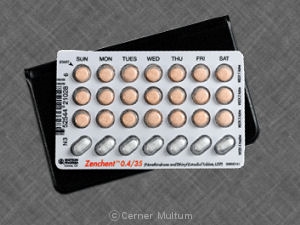
What is the most important information I should know about birth control pills?
Do not use birth control pills if you are pregnant or if you have recently had a baby.
You should not use birth control pills if you have: uncontrolled high blood pressure, heart disease, coronary artery disease, circulation problems (especially with diabetes), undiagnosed vaginal bleeding, liver disease or liver cancer, severe migraine headaches, if you also take certain hepatitis C medication, if you will have major surgery, if you smoke and are over 35, or if you have ever had a heart attack, a stroke, a blood clot, jaundice caused by pregnancy or birth control pills, or cancer of the breast, uterus/cervix, or vagina.
Taking birth control pills can increase your risk of blood clots, stroke, or heart attack.
Smoking can greatly increase your risk of blood clots, stroke, or heart attack. You should not take this medicine if you smoke and are over 35 years old.
What is ethinyl estradiol and norethindrone?
Ethinyl estradiol and norethindrone is a combination birth control pill containing female hormones that prevent ovulation (the release of an egg from an ovary). This medication also causes changes in your cervical mucus and uterine lining, making it harder for sperm to reach the uterus and harder for a fertilized egg to attach to the uterus.
Ethinyl estradiol and norethindrone is used as contraception to prevent pregnancy. This medicine is also used to treat moderate acne in women who are at least 15 years old and have started having menstrual periods, and who wish to use birth control pills. There are many available brands of ethinyl estradiol and norethindrone. Not all brands are listed on this leaflet.
Ethinyl estradiol and norethindrone may also be used for purposes not listed in this medication guide.
What should I discuss with my healthcare provider before taking birth control pills?
Taking birth control pills can increase your risk of blood clots, stroke, or heart attack. You are even more at risk if you have high blood pressure, diabetes, high cholesterol, or if you are overweight. Your risk of stroke or blood clot is highest during your first year of taking birth control pills. Your risk is also high when you restart birth control pills after not taking them for 4 weeks or longer.
Smoking can greatly increase your risk of blood clots, stroke, or heart attack. Your risk increases the older you are and the more you smoke. You should not take combination birth control pills if you smoke and are over 35 years old.
Do not use if you are pregnant. Stop using this medicine and tell your doctor right away if you become pregnant, or if you miss 2 menstrual periods in a row. If you have recently had a baby, wait at least 4 weeks before taking birth control pills.
You should not take birth control pills if you have:
- untreated or uncontrolled high blood pressure;
- heart disease (chest pain, coronary artery disease, history of heart attack, stroke, or blood clot);
- an increased risk of having blood clots due to a heart problem or a hereditary blood disorder;
- circulation problems (especially if caused by diabetes);
- a history of hormone-related cancer, or cancer of the breast, uterus/cervix, or vagina;
- unusual vaginal bleeding that has not been checked by a doctor;
- liver disease or liver cancer;
- severe migraine headaches (with aura, numbness, weakness, or vision changes), especially if you are older than 35;
- a history of jaundice caused by pregnancy or birth control pills;
- if you smoke and are over 35 years old; or
- if you take any hepatitis C medication containing ombitasvir/paritaprevir/ritonavir (Technivie).
Tell your doctor if you have ever had:
- heart problems, high blood pressure, or if you are prone to having blood clots;
- high cholesterol or triglycerides, or if you are overweight;
- depression;
- a seizure or migraine headache;
- diabetes, gallbladder disease, underactive thyroid;
- liver or kidney disease;
- irregular menstrual cycles; or
- fibrocystic breast disease, lumps, nodules, or an abnormal mammogram.
This medicine may slow breast milk production. Tell your doctor if you are breast-feeding.
How should I take birth control pills?
Follow all directions on your prescription label and read all medication guides or instruction sheets. Use the medicine exactly as directed.
You may need to use back-up birth control, such as condoms with spermicide, when you first start using this medication. Follow your doctor's instructions.
Take one pill every day, no more than 24 hours apart. When the pills run out, start a new pack the following day. You may get pregnant if you do not take one pill daily.
Some birth control packs contain "reminder" pills to keep you on your regular cycle. Your period will usually begin while you are using these reminder pills.
Use a back-up birth control if you are sick with severe vomiting or diarrhea.
You may have breakthrough bleeding, especially during the first 3 months. Tell your doctor if this bleeding continues or is very heavy.
If you need major surgery or will be on long-term bed rest, you may need to stop using this medicine for a short time. Any doctor or surgeon who treats you should know that you are using ethinyl estradiol and norethindrone.
While taking birth control pills, you will need to visit your doctor regularly.
Store at room temperature away from moisture and heat.
What happens if I miss a dose?
Follow the patient instructions provided with your medicine. Missing a pill increases your risk of becoming pregnant.
If you miss 1 active pill, take 2 pills on the day you remember. Then take 1 pill per day for the rest of the pack.
If you miss 2 active pills in a row in Week 1 or 2, take 2 pills per day for 2 days in a row. Then take 1 pill per day for the rest of the pack. Use back-up birth control for at least 7 days following the missed pills.
If you miss 2 active pills in a row in Week 3, throw out the rest of the pack and start a new pack the same day if you are a Day 1 starter. If you are a Sunday starter, keep taking a pill every day until Sunday. On Sunday, throw out the rest of the pack and start a new pack that day.
If you miss 3 active pills in a row in Week 1, 2, or 3, throw out the rest of the pack and start a new pack on the same day if you are a Day 1 starter. If you are a Sunday starter, keep taking a pill every day until Sunday. On Sunday, throw out the rest of the pack and start a new pack that day.
If you miss 2 or more active pills, you may not have a period during the month. If you miss a period for 2 months in a row, call your doctor because you might be pregnant.
If you miss a reminder pill, throw it away and keep taking 1 reminder pill per day until the pack is empty.
What happens if I overdose?
Seek emergency medical attention or call the Poison Help line at 1-800-222-1222. Overdose may cause nausea or vaginal bleeding.
What should I avoid while taking birth control pills?
Do not smoke while taking birth control pills, especially if you are older than 35 years of age.
Birth control pills will not protect you from sexually transmitted diseases--including HIV and AIDS. Using a condom is the only way to protect yourself from these diseases.
What are the possible side effects of birth control pills?
Get emergency medical help if you have signs of an allergic reaction: hives; difficult breathing; swelling of your face, lips, tongue, or throat.
Stop using this medicine and call your doctor at once if you have:
- signs of a stroke --sudden numbness or weakness (especially on one side of the body), sudden severe headache, slurred speech, problems with vision or balance;
- signs of a blood clot --sudden vision loss, stabbing chest pain, feeling short of breath, coughing up blood, pain or warmth in one or both legs;
- heart attack symptoms --chest pain or pressure, pain spreading to your jaw or shoulder, nausea, sweating;
- liver problems --loss of appetite, upper stomach pain, tiredness, dark urine, clay-colored stools, jaundice (yellowing of the skin or eyes);
- increased blood pressure --severe headache, blurred vision, pounding in your neck or ears;
- swelling in your hands, ankles, or feet;
- a change in the pattern or severity of migraine headaches;
- a breast lump; or
- symptoms of depression --sleep problems, weakness, tired feeling, mood changes.
Common side effects may include:
- nausea, vomiting;
- breast tenderness;
- breakthrough bleeding;
- headache; or
- problems with contact lenses.
This is not a complete list of side effects and others may occur. Call your doctor for medical advice about side effects. You may report side effects to FDA at 1-800-FDA-1088.
What other drugs will affect birth control pills?
Other drugs may affect birth control pills, including prescription and over-the-counter medicines, vitamins, and herbal products. Some drugs can make birth control pills less effective, which may result in pregnancy. Tell your doctor about all your current medicines and any medicine you start or stop using.
Where can I get more information?
Your pharmacist can provide more information about ethinyl estradiol and norethindrone.
Remember, keep this and all other medicines out of the reach of children, never share your medicines with others, and use this medication only for the indication prescribed.
Every effort has been made to ensure that the information provided by Cerner Multum, Inc. ('Multum') is accurate, up-to-date, and complete, but no guarantee is made to that effect. Drug information contained herein may be time sensitive. Multum information has been compiled for use by healthcare practitioners and consumers in the United States and therefore Multum does not warrant that uses outside of the United States are appropriate, unless specifically indicated otherwise. Multum's drug information does not endorse drugs, diagnose patients or recommend therapy. Multum's drug information is an informational resource designed to assist licensed healthcare practitioners in caring for their patients and/or to serve consumers viewing this service as a supplement to, and not a substitute for, the expertise, skill, knowledge and judgment of healthcare practitioners. The absence of a warning for a given drug or drug combination in no way should be construed to indicate that the drug or drug combination is safe, effective or appropriate for any given patient. Multum does not assume any responsibility for any aspect of healthcare administered with the aid of information Multum provides. The information contained herein is not intended to cover all possible uses, directions, precautions, warnings, drug interactions, allergic reactions, or adverse effects. If you have questions about the drugs you are taking, check with your doctor, nurse or pharmacist.
Copyright 1996-2020 Cerner Multum, Inc. Version: 15.02. Revision date: 9/6/2018.
